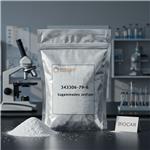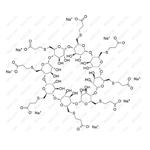Description
To facilitate tracheal intubation, mechanical ventilation, and surgical
access, NMB agents are frequently used as non-anesthetic adjuncts in
surgical procedures.
Sugammadex is able to function as a pharmacologic sink of rocuronium and vecuronium, another non-depolarizing
neuromuscular blocker, without the cardiovascular adverse effects
experienced with reversal agents that directly interact with the
cholinergic system. The γ-cyclodextrin has been designed to enhance
binding of the guest by incorporating acidic side chains to promote an
electrostatic interaction with the positive nitrogen of the blocker. Starting
with γ-cyclodextrin, these side chains are readily installed by first
halogenating with iodine or bromine to provide a handle for nucleophilic
displacement with either 3-mercaptopropionic acid in the presence of
sodium hydride or with 3-mercaptopropionic acid methyl ester
and cesium carbonate. The latter requires hydrolysis with sodium
hydroxide to generate sugammadex sodium.
Chemical Properties
White to Light yellow powder to crystal.Soluble in water, insoluble in methanol and ethanol.
Originator
Organon (Netherlands)
Uses
Sugammadex Sodium is the first in a class of drugs called selective relaxant binding agents that offers improved termination of the paralytic effects of neuromuscular blocking agents and may have many potential peri-operative benefits.
Application
Sugammadex sodium is a modified γ-cyclodextrin. It is a selective relaxant binding agent (SRBA) indicated for reversal of neuromuscular block induced by steroid-based muscle relaxants, such as rocuronium bromide and vecuronium bromide. Sugammadex soium forms a complex with the muscle relaxants, and it reduces the amount of them available to bind to nicotinic cholinergic receptors in the neuromuscular junction.
Definition
ChEBI: Sugammadex sodium is an organic sodium salt that is the octasodium salt of sugammadex. Used for reversal of neuromuscular blockade induced by rocuronium and vecuronium in adults undergoing surgery. It has a role as a neuromuscular agent. It contains a sugammadex(8-).
Side effects
The most common adverse effects included coughing, movement, vomiting, dry mouth, dysgeusia, hypotension, parosmia, and a sensation of changed temperature.Sugammadex is recommended for the reversal of neuromuscular blockade induced by rocuronium or vecuronium; it should not be used with other steroidal blocking agents since safety and efficacy data are not available for these situations. It should also not be partnered with non-steroidal neuromuscular blockers such as succinylcholine or benzylisoquinolinium-based drugs. Since sugammadex is predominantly cleared by the kidneys, care should be taken when administering this reversal agent in patients with renal impairment.
Mode of action
Sugammadex Sodium is the sodium salt form of sugammadex, a biologically inert, selective relaxant binding agent (SRBA) composed of a modified, anionic gamma cyclodextrin derivative containing a hydrophilic exterior and a hydrophobic core, with neuromuscular blocking drug (NMBD) reversal activity. Upon administration, the negatively charged carboxyl-thio-ether groups of sugammadex selectively and reversibly bind to the positively charged quaternary nitrogen of a steroidal NMBD, such as rocuronium and vecuronium, which was administered at an earlier time for anesthetic purposes. The encapsulation of the NMBD by sugammadex blocks its ability to bind to nicotinic receptors in the neuromuscular junction and thereby reverses the NMBD-induced neuromuscular blockade.




